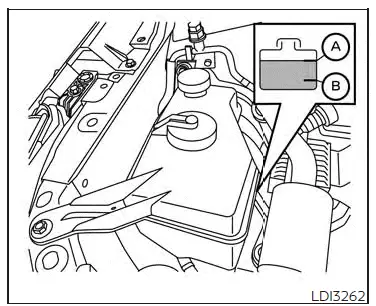Nissan Altima (L34) 2019-2025 Owners Manual: Engine cooling system
The engine cooling system is filled at the factory with a pre-diluted mixture of 50% Genuine NISSAN Long Life Antifreeze/ Coolant (blue) and 50% water to provide year-round antifreeze and coolant protection.
The antifreeze solution contains rust and corrosion inhibitors. Additional engine cooling system additives are not necessary.
WARNING
- Never remove the radiator or coolant
reservoir cap when the engine is hot.
Wait until the engine and radiator cool down. Serious burns could be caused by high pressure fluid escaping from the radiator. For additional information on precautions, see "If your vehicle overheats".
- The radiator is equipped with a pressure type radiator cap. To prevent engine damage, use only a Genuine NISSAN radiator cap.
CAUTION
- Never use any cooling system additives such as radiator sealer. Additives may clog the cooling system and cause damage to the engine, transmission and/or cooling system.
- When adding or replacing coolant, be
sure to use only Genuine NISSAN
Long Life Antifreeze/Coolant (blue)
or equivalent. Genuine NISSAN Long
Life Antifreeze/Coolant (blue) is prediluted
to provide antifreeze protection
to -34º F (-37º C). If additional
freeze protection is needed due to
weather where you operate your
vehicle, add Genuine NISSAN Long
Life Antifreeze/Coolant (blue) concentrate
following the directions on
the container. If an equivalent coolant
other than Genuine NISSAN Long
Life Antifreeze/Coolant (blue) is used,
follow the coolant manufacturer’s instructions
to maintain minimum antifreeze
protection to -34º F (-37º C).
The use of other types of coolant solutions other than Genuine NISSAN Long Life Antifreeze/Coolant (blue) or equivalent may damage the engine cooling system.
- The life expectancy of the factory-fill coolant is 105,000 miles (168,000 km) or 7 years. Mixing any other type of coolant other than Genuine NISSAN Long Life Antifreeze/Coolant (blue) (or equivalent coolant), including Genuine NISSAN Long Life Antifreeze/Coolant (green), or the use of non-distilled water may reduce the life expectancy of the factory-fill coolant. For additional information, see the "Maintenance and schedules" section of this manual.
Checking engine coolant level

Check the coolant level in the reservoir when the engine is cold. If the coolant level is below the MIN level B, add coolant to the MAX level A.
If the reservoir is empty, check the coolant level in the radiator when the engine is cold. If there is insufficient coolant in the radiator, fill the radiator with coolant up to the filler opening and also add it to the reservoir up to the MAX level A. Start the engine and allow the engine coolant temperature gauge to rise until it reaches normal operating temperature. For additional information, see "Engine coolant temperature gauge". Turn off the engine once the engine coolant temperature has reached normal operating range. Allow the engine coolant to cool to ambient temperature.
Recheck the coolant level in the reservoir and add coolant to the MAX level if necessary.
This vehicle contains Genuine NISSAN Long Life Antifreeze/Coolant (blue). The life expectancy of the factory-fill coolant is 105,000 miles (168,000 km) or 7 years. Mixing any other type of coolant or the use of non-distilled water will reduce the life expectancy of the factory-fill coolant. For additional information, see the "Maintenance and schedules" section of this manual.
For additional information on the location of the engine coolant reservoir, see "Engine compartment check locations".
If the cooling system frequently requires coolant, have it checked. It is recommended that you visit a NISSAN dealer for this service.
Changing engine coolant
A NISSAN dealer can change the engine coolant. The service procedure can be found in the NISSAN Service Manual.
Improper servicing can result in reduced heater performance and engine overheating.
WARNING
- To avoid the danger of being scalded, never change the coolant when the engine is hot.
- Never remove the radiator cap when the engine is hot. Serious burns could be caused by high pressure fluid escaping from the radiator.
- Avoid direct skin contact with used coolant. If skin contact is made, wash thoroughly with soap or hand cleaner as soon as possible.
- Keep coolant out of the reach of children and pets.
Engine coolant must be disposed of properly.
Check your local regulations.

 Engine compartment check locations
Engine compartment check locations Engine oil
Engine oil